Premium Only Content

An Irish Statesman and Revolutionary: The Politics of Seán MacBride (1983)
The dark side of history: https://thememoryhole.substack.com/
Seán MacBride (26 January 1904 – 15 January 1988) was an Irish Clann na Poblachta politician who served as Minister for External Affairs from 1948 to 1951, Leader of Clann na Poblachta from 1946 to 1965 and Chief of Staff of the IRA from 1936 to 1937. He served as a Teachta Dála (TD) from 1947 to 1957.[2][3]
Rising from a domestic Irish political career, he founded or participated in many international organisations of the 20th century, including the United Nations, the Council of Europe and Amnesty International. He received the Nobel Peace Prize in 1974, the Lenin Peace Prize for 1975–1976 and the UNESCO Silver Medal for Service in 1980.
Early life
MacBride was born in Paris in 1904, the son of Maud Gonne and Major John MacBride.[4] As a founding member of Inghinidhe na hÉireann and Cumann na mBan, his mother was to become a prominent figure in Irish nationalist and republican circles.[5][6] Later, in the thirties, she became a devotee of the social credit ideas of Major C.H. Douglas[7] and was "noisily anti-Semitic".[8][9] His father had led the Irish Transvaal Brigade against the British in the Second Boer War. Within a year of MacBride's birth, he returned to Dublin where, following his participation in the Easter Rising, John MacBride was court-martialed by the British and executed in May 1916.[10][11][12]
MacBride's first language was French, and he retained, or as some would claim, affected a French accent in the English language for the rest of his life.[13][14][15] MacBride first studied at the Lycée Saint-Louis-de-Gonzague, and remained in Paris until his father's execution by the British for his involvement in the 1916 Easter Rising, when he was sent to school at Mount St Benedict's, Gorey, County Wexford in Ireland, and briefly at the Downside School.[16]
MacBride first became involved in politics during the 1918 Irish general election in which he was active for Sinn Féin. The following year in 1919, aged 15, he lied about his age to join the Irish Volunteers, which fought as part of the Irish Republican Army, and took part in the Irish War of Independence. He opposed the 1921 Anglo-Irish Treaty and was imprisoned by the Irish Free State during the Irish Civil War.[17]
Anti-Treaty IRA, cooperation with the Soviets
On his release in 1924, MacBride studied law at University College Dublin and resumed his IRA activities.[18] He worked briefly for Éamon de Valera as his personal secretary, travelling with him to Rome to meet various dignitaries.
In January 1925, on his twenty-first birthday, MacBride married Catalina "Kid" Bulfin, a woman four years his senior who shared his political views.[19] Bulfin was the daughter of the Irish nationalist publisher and travel-writer William Bulfin.
Before returning to Dublin in 1927, where he became the IRA's Director of Intelligence, MacBride worked as a journalist in Paris and London.
According to historians Tom Mahon and James J. Gillogly, recently deciphered IRA messages from the 1920s reveal that the organisation's two main sources of funding were Clan na Gael and the Soviet Union.[20] The messages further reveal that MacBride, before becoming IRA Director of Intelligence, was involved in the espionage activities in Great Britain of GRU spymaster Walter Krivitsky, whom ciphered IRA communications referred to only by the code name "James".[21]
In addition to supplying the USSR with detailed information on Royal Navy ships and Royal Air Force airplane engines, MacBride provided Soviet agents with "a brief specification and a complete drawing" of ASDIC, an early sonar detection system for enemy submarines during wartime, at a covert meeting in Amsterdam during the autumn of 1926.[22] MacBride also assisted the GRU by providing forged passports to Soviet intelligence operatives who were at risk of capture.[23]
In October 1926, MacBride sent a ciphered report from Paris to his IRA superiors about Soviet counterfeiting operations, saying, "Several bad Bank of England notes have been passed here lately. These are said to emanate from Russia."[24]
Soon after his return to Dublin in 1927, he was arrested and charged with the murder of politician Kevin O'Higgins, who had been assassinated near his home in Booterstown, County Dublin. At his trial, however, Cumann na nGaedheal politician Bryan Cooper testified as a witness for the defence that, at the time of Kevin O'Higgins' murder, both he and MacBride had been aboard a ferry travelling from Britain to Ireland. MacBride was then charged with being a subversive and interned in Mountjoy Prison.[25]
In September 1927, Krivitsky sent the IRA a message from Amsterdam, demanding to see MacBride immediately, claiming to have a "present" he was anxious to give away, and naming a cafe where the meeting could take place. As MacBride was then imprisoned in Dublin, the IRA's chief of staff, Moss Twomey, replied that the request was "rather awkward and impossible to fulfill at the present". In response, Twomey and two other senior IRA members travelled to Amsterdam and met with Krivitsky instead.[26]
In 1929 an Irish section of the League Against Imperialism was formed and MacBride served as its secretary.[27] Aimed at creating a "mass anti-imperialist movement", the organization was founded with the support of the Comintern.[28]
Towards the end of the 1920s, after many supporters had left to join Fianna Fáil, some members of the IRA started pushing for a more left-wing agenda. After the IRA Army Council voted down the idea, MacBride launched a new movement, Saor Éire ("Free Ireland"), in 1931. Although it was a non-military organisation, Saor Éire was declared unlawful along with the IRA, Cumann na mBan and nine other bodies. MacBride, meanwhile, became the security services' number-one target.[29]
In 1936, the IRA's chief of staff Moss Twomey was sent to prison for three years; he was replaced by MacBride. At the time, the movement was in a state of disarray, with conflicts between several factions and personalities. Tom Barry was appointed chief of staff to head up a military operation against the British, an action with which MacBride did not agree.[30]
In 1937, MacBride was called to the bar. He then resigned from the IRA when the Constitution of Ireland was enacted later that year. As a barrister, MacBride frequently defended IRA prisoners of the state (Thomas Hart & Patrick McGrath). MacBride was unsuccessful in preventing the 1944 death by hanging of Charlie Kerins, who had been convicted based on fingerprint evidence of the 1942 ambush and murder of Garda Detective Sergeant Denis O'Brien. In 1946, during the inquest into the death of Seán McCaughey, MacBride embarrassed the Irish State by forcing them to admit that conditions in Portlaoise Prison were inhumane.[31]
Clann na Poblachta, Minister for External Affairs
Main article: Clann na Poblachta
MacBride circa 1947 when he founded Clann na Poblachta
In 1946, MacBride founded the republican/socialist party Clann na Poblachta. He hoped it would replace Fianna Fáil as Ireland's major political party. In October 1947, he won a seat in Dáil Éireann at a by-election in the Dublin County constituency.[32] On the same day, Patrick Kinane also won the Tipperary by-election for Clann na Poblachta.[33]
However, at the 1948 general election Clann na Poblachta won only ten seats. The party joined with Fine Gael, the Labour Party, the National Labour Party, Clann na Talmhan and several independents to form the First Inter-Party Government with Fine Gael TD John A. Costello as Taoiseach. Richard Mulcahy was the Leader of Fine Gael, but MacBride and many other Irish Republicans had never forgiven Mulcahy for his role in carrying out 77 executions under the government of the Irish Free State in the 1920s during the Irish Civil War. To gain the support of Clann na Poblachta, Mulcahy stepped aside in favour of Costello. Two Clann na Poblachta TDs joined the cabinet; MacBride became Minister for External Affairs[4] while Noël Browne became Minister for Health.
On his ministerial accession, MacBride sent a telegram to Pope Pius XII offering:
...to repose at the feet of Your Holiness the assurance of our filial loyalty and our devotion to Your August Person, as well as our firm resolve to be guided in all our work by the teaching of Christ and to strive for the attainment of a social order in Ireland based on Christian principles.[34]
At MacBride's suggestion, Costello nominated the northern Protestant Denis Ireland to Seanad Éireann,[35] the first resident of Northern Ireland to be appointed as a member of the Oireachtas. While a Senator (1948–1951), Ireland was Irish representative to the Council of Europe assisting MacBride in the leading role he was to play in securing acceptance of the European Convention on Human Rights—signed in Rome on 4 November 1950.[36] In 1950, MacBride was president of the Council of Foreign Ministers of the Council of Europe, and he was vice-president of the Organisation for European Economic Co-operation (OEEC, later OECD) in 1948–1951. He was responsible for Ireland not joining the North Atlantic Treaty Organisation (NATO).[37]
He was instrumental in the repeal of the External Relations Act and the passing of the Republic of Ireland Act which came into force in 1949. It declared that Ireland may officially be described as the Republic of Ireland and that the President of Ireland had the executive authority of the state in its external relations.
In 1951, MacBride controversially ordered Noël Browne to resign as a minister over the Mother and Child Scheme after it was attacked by the Irish Catholic hierarchy and the Irish medical establishment.[38][39] Whatever the merits of the scheme, or of Browne, MacBride concluded in a Cabinet memorandum:
Even if, as Catholics, we were prepared to take the responsibility of disregarding [the Hierarchy's] views, which I do not think we can do, it would be politically impossible to do so . . . We are dealing with the considered views of the leaders of the Catholic Church to which the vast majority of our people belong; these views cannot be ignored.[40]
Also in 1951, Clann na Poblachta was reduced to two seats after the general election. MacBride kept his seat and was re-elected again in 1954. Opposing the internment of IRA suspects during the Border Campaign (1956–1962), he contested both the 1957 and 1961 general elections but failed to be elected both times. He then retired from politics and continued practising as a barrister.
International roles and commissions
Seán MacBride in 1986
After retiring from politics in Ireland, MacBride assumed various international commissions and roles. He was among a group of lawyers who founded JUSTICE—the UK-based human rights and law reform organisation—initially to monitor the show trials after the 1956 Budapest uprising,. Later it became the UK section of the International Commission of Jurists for which MacBride, from 1963 to 1971, was Secretary-General. In 1966, his standing on the Commission was unsuccessfully challenged by US claims that he had been involved with a Central Intelligence Agency funding operation.[41]
In 1961, MacBride was a co-founder of Amnesty International, and he served as its International Chairman until 1975.[42]
In 1963, he had helped draft the constitution of the Organisation of African Unity (OAU); following consultations on the constitutions of newly-independent Ghana, Zambia and Tanzania.[43]
In 1968, MacBride was elected Chair and, in 1975, President of the International Peace Bureau in Geneva, a position he retained until 1985.[44] He was also involved in the International Prisoners of Conscience Fund.[45][1]
In the course of the 1970s, he held various positions with the United Nations.[44] In 1973, he was elected by the UN General Assembly to the post of High Commissioner for Namibia, with the rank of Assistant Secretary-General. It was thought that, represented by man whose father had volunteered to fight alongside their forefathers, the Afrikaner leadership of Apartheid South Africa would find the UN’s assurances in return for a withdrawal from Namibia more credible.[43]
In 1977, MacBride was appointed president of the International Commission for the Study of Communication Problems, set up by UNESCO. In 1980, this produced the controversial MacBride Report which called for policies to reduce the international dominance of the western media.[46]
During the 1980s, he initiated the Appeal by Lawyers against Nuclear War[47] which was jointly sponsored by the International Peace Bureau and the International Progress Organization. In close co-operation with Francis Boyle and Hans Köchler of the International Progress Organization he lobbied the General Assembly for a resolution demanding an Advisory Opinion from the International Court of Justice on the legality of nuclear arms. The Advisory Opinion on the Legality of the Threat or Use of Nuclear Weapons was eventually handed down by the ICJ in 1996.
In 1982, MacBride was chairman of the International Commission to enquire into reported violations of International Law by Israel during its invasion of the Lebanon. The other members were Richard Falk, Kader Asmal, Brian Bercusson, Géraud de la Pradelle, and Stefan Wild. The commission's report, which concluded that "the government of Israel has committed acts of aggression contrary to international law", was published in 1983 under the title Israel in Lebanon.[48]
Nobel Peace Prize and other international honours
MacBride's work was awarded the Nobel Peace Prize (1974)[49] as a man who "mobilised the conscience of the world in the fight against injustice" He shared the prize with Eisaku Sato, the former Japanese Prime Minister acknowledged for his commitment to peace and non-proliferation.[50]
Other international honours followed: the Lenin Peace Prize in 1975; the Golden Plate Award of the American Academy of Achievement in 1978;[51] and the UNESCO Silver Medal for Service (1980). He received the Lenin Peace Prize for his opposition to what MacBride referred to as "this absolutely obscene arms race." He was one of only two to win both the Lenin and Nobel peace prizes, the other being Linus Pauling.[52]
Last Irish interventions
In 1977, in the midst of the Northern Ireland Troubles, MacBride co-operating with Desmond Boal (QC and former chairman of Ian Paisley's Democratic Unionist Party) as joint mediator in confidential negotiations between the Provisional IRA (PIRA) and the Ulster Volunteer Force about a federal settlement for Ireland.[53] Their efforts included a meeting, brokered by West Belfast priest Des Wilson, between Boal and Gerry Adams. Inasmuch as their exchange was “frank”, Adams found the discussion “constructive”, but it failed to identify common political ground.[54]
In 1984, MacBride was one of four well known Irish activists, two Catholic and two Protestants, who endorsed a set of fair-employment guidelines for American investment in Northern Ireland, intended to redress a history of sectarian discrimination.[55][56] The campaign for what became known as the MacBride Principles resulted in both British and American legislation.[57]
In the Irish Republic, MacBride edited a 1981 report of a Commission of Enquiry into the Irish Penal System. Crime and Punishment broadly condemned the country's prisons, unreformed since independence, for failing to address the task of offender rehabilitation and consequently for its high degree of recidivism.[58]
In 1983, MacBride voted yes to the Eighth Amendment to the Constitution, enshrining the legal ban on abortion, and wrote a newspaper article two days before stating his position.[59] In 1985, he supported the largely female workforce in the Dunnes Stores Strike and attended at least one of their rallies.[43]
Later life and death
In his later years, MacBride lived in his mother's home, Roebuck House, that served as a meeting place for many years for Irish nationalists, as well as in the Parisian arrondissement where he grew up with his mother.
Seán MacBride died in Dublin on 15 January 1988, eleven days before his 84th birthday. He is buried in Glasnevin Cemetery alongside his mother, and his wife, who died in 1976.
On the occasion of MacBride's death, Oliver Tambo of the African National Congress (ANC), stated "Seán MacBride will always be remembered for the concrete leadership he provided to the liberation movement and people of Namibia and South Africa. Driven by his own personal and political insight arising out of the cause of national freedom in Ireland ... our debt to him can never be repaid."[43]
Legacy
Streets in Windhoek, Namibia and Amsterdam are named after him.[43] The Headquarters of Amnesty International Ireland is called 'Seán MacBride House' in his honour.[60] and the International Peace Bureau likewise named the 'Seán MacBride Prize' in his name.[61]
A bust of MacBride was unveiled in Iveagh House, headquarters of the Irish Department of Foreign Affairs in 1995.[62]
In popular culture
A novel, The Casting of Mr O'Shaughnessy, was published in 1995 (revised edition 2002) by Éamon Delaney in which the eponymous Mr O'Shaughnessy was, in the author's own words "partly, but quite obviously, based on the career of the colourful Seán MacBride".[63]
Career summary
1946–1965 Leader of Clann na Poblachta
1947–1958 Member of Dáil Éireann
1948–1951 Minister for External Affairs of Ireland in Inter-Party Government
1948–1951 Vice-president of the Organization for European Economic Cooperation (OEEC)
1950 President, Committee of Ministers of Council of Europe
1954 Offered but declined, Ministerial office in Irish Government
1963–1971 Secretary-General, International Commission of Jurists
1966 Consultant to the Pontifical Commission on Justice and Peace
1961–1975 chairman Amnesty International Executive
1968–1974 Chairman of the Executive International Peace Bureau
1975–1985 President of the Executive International Peace Bureau
1968–1974 Chairman Special Committee of International NGOs on Human Rights (Geneva)
1973 Vice-chairman, Congress of World Peace Forces (Moscow, October 1973)
1973 Vice-president, World Federation of United Nations Associations
1973–1977 Elected by the General Assembly of the United Nations to the post of United Nations Commissioner for Namibia with rank of Assistant Secretary-General of the United Nations
1977–1980 Chairman, Commission on International Communication for UNESCO
1982 Chairman of the International Commission to enquire into reported violations of International Law by Israel during its invasion of the Lebanon
Further reading
Keane, Elizabeth (2006). An Irish Statesman and Revolutionary: The Nationalist and Internationalist Politics of Seán MacBride. Tauris.
Jordan, Anthony J, (1993), Seán A biography of Seán MacBride, Blackwater Press
References
"Seán MacBride | Irish statesman". Encyclopedia Britannica. Archived from the original on 29 June 2019. Retrieved 28 August 2019.
"Seán MacBride". Oireachtas Members Database. Archived from the original on 20 April 2019. Retrieved 22 September 2009.
Keane, Ronan. "MacBride, Seán". Dictionary of Irish Biography. Retrieved 28 May 2022.
Saturday Evening Post; 23 April 1949, Vol. 221 Issue 43, pp. 31–174, 5p
"MacBride, (Edith) Maud Gonne | Dictionary of Irish Biography". www.dib.ie. Retrieved 14 June 2021.
Bendheim, Kim (2021). The Fascination of What's Difficult: A Life of Maud Gonne. OR Books. ISBN 978-1682192061.
Warren, Gordon (24 November 2020). "Maud Gonne and the 1930s' movement for basic income in Ireland". {{cite journal}}: Cite journal requires |journal= (help)
Boyce, David George (1 January 1988). Revolution in Ireland, 1879–1923. Macmillan International Higher Education. ISBN 978-1-349-18985-4.
Garvin, Tom (13 September 2005). Nationalist Revolutionaries in Ireland 1858–1928: Patriots, Priests and the Roots of the Irish Revolution. Gill & Macmillan Ltd. ISBN 978-0-7171-6362-5.
McCarthy, Mark (2018). "Making Irish Martyrs: The Impact and Legacy of the Execution of the Leaders of the Easter Rising, 1916". In Outram, Quentin; Laybourn, Keith (eds.). Secular Martyrdom in Britain and Ireland (PDF). Springer Nature. p. 171. doi:10.1007/978-3-319-62905-6. ISBN 978-3-319-62905-6. LCCN 2017947721.
McEvoy, Dermot (18 April 2021). "Arbour Hill, Dublin's forgotten memorial to the men of 1916". Irish Central. Retrieved 6 November 2022.
Jordan Anthony J. The Yeats Gonne MacBride Triangle (Westport Books 2000) pp. 49–104
Dungan, Myles (2007). Speaking ill of the dead. New Island Books. p. 156.
Delaney, Eamon (2001). An Accidental Diplomat. New Island Books. p. 391.
Ireland - A Television History - Part 10 of 13 - 'Civil War 1921-1923', archived from the original on 29 December 2019, retrieved 28 August 2019
"Mount St Benedict - Craanford Monaseed Hollyfort".
Jordan, Anthony J. (1993). Seán MacBride: A Biography. Dublin: Blackwater Press. pp. 26–35. ISBN 0-86121-453-6.
Jordan (1993), p. 41.
Jordan (1993), p. 42.
Tom Mahon and James J. Gillogly (2008), Decoding the IRA, Mercier Press, Cork City. Page 251.
Tom Mahon and James J. Gillogly (2008), Decoding the IRA, Mercier Press, Cork City. Pages 253-262.
Tom Mahon and James J. Gillogly (2008), Decoding the IRA, Mercier Press, Cork City. Pages 253-254.
Tom Mahon and James J. Gillogly (2008), Decoding the IRA, Mercier Press, Cork City. Page 254.
Tom Mahon and James J. Gillogly (2008), Decoding the IRA, Mercier Press, Cork City. Page 256.
Jordan (1993), p. 47.
Tom Mahon and James J. Gillogly (2008), Decoding the IRA, Mercier Press, Cork City. Page 262.
Edwards, Robert Dudley; Moody, Theodore William (2003). Irish Historical Studies: Joint Journal of the Irish Historical Society and the Ulster Society for Irish Historical Studies. Hodges, Figgis & Company. Archived from the original on 26 July 2021. Retrieved 25 September 2020.
Jani, Disha Karnad (2022). "The league against imperialism, national liberation, and the economic question". Journal of Global History. 17 (2): 210–232. doi:10.1017/S1740022822000079. ISSN 1740-0228. S2CID 248445034.
Jordan (1993), p. 57.
Jordan (1993), p. 70.
Hanley, Brian (2010). The IRA: A Documentary History 1916–2005. Dublin: Gill & Macmillan. p. 122. ISBN 978-0717148134.
"Seán MacBride". ElectionsIreland.org. Archived from the original on 30 November 2010. Retrieved 22 December 2009.
Jordan (1993), pp. 86–98
Semple, Patrick (18 November 2014). "Previous generations would be astounded at attitudes to churches in Ireland today A 60-year journey from obsequious conformity". Irish Times. Archived from the original on 27 October 2020. Retrieved 25 September 2018.
"Denis Ireland". Oireachtas Members Database. Archived from the original on 7 November 2018. Retrieved 15 July 2013.
William Schabas (2012). "Ireland, The European Convention on Human Rights, and the Personal Contribution of Seán MacBride," in Judges, Transition, and Human Rights, John Morison, Kieran McEvoy, and Gordon Anthony eds., Published to Oxford Scholarship Online: March 2012
Jordan (1993), p. 115
Jordan (1993), pp. 125–140
Blanshard, Paul (1954). The Irish and Catholic Power: an American Interpretation. London: Derek Verschoyle. pp. 78–79.
Ronan Fanning (6 December 2009) The age of our craven deference is finally over Archived 23 October 2012 at the Wayback Machine. The Independent.
"Peter Benenson". The Independent. 28 February 2005. Archived from the original on 30 October 2020. Retrieved 24 October 2020.
"Peace Prize Laureates: Seán MacBride 1974". peaceprizelaureates.nobelpeacecenter.org. Retrieved 24 August 2023.
"Seán MacBride and Namibia". History Ireland. 21 February 2013. Archived from the original on 19 August 2019. Retrieved 28 August 2019.
"The Nobel Peace Prize 1974". NobelPrize.org. Retrieved 24 August 2023.
Jordan (1993), pp. 157–165
"The MacBride Report". archive.ccrvoices.org. Retrieved 24 August 2023.
Appeal by Lawyers against Nuclear War Archived 21 October 2006 at the Wayback Machine. I-p-o.org. Retrieved 30 July 2012.
MacBride, Seán; A. K. Asmal; B. Bercusson; R. A. Falk; G. de la Pradelle; S. Wild (1983). Israel in Lebanon: The Report of International Commission to enquire into reported violations of International Law by Israel during its invasion of the Lebanon. London: Ithaca Press. p. 191. ISBN 0-903729-96-2.
United Nations Chronicle, Sep95, Vol. 32 Issue 3, p. 14, 2/5p, 1c; (AN 9511075547)
"Eisaku Sato". Nobel Prize. The Norwegian Nobel Institute. Retrieved 21 January 2015.
"Golden Plate Awardees of the American Academy of Achievement". www.achievement.org. American Academy of Achievement. Archived from the original on 15 December 2016. Retrieved 4 November 2020.
Blair, William G. (16 January 1988). "Sean MacBride of Ireland Is Dead at 83". The New York Times. ISSN 0362-4331. Archived from the original on 19 August 2019. Retrieved 28 August 2019.
Maune, Patrick (2022). "Boal, Desmond Norman Orr | Dictionary of Irish Biography". www.dib.ie. Retrieved 21 August 2023.
Sharrock and Devenport (1997), p. 155
"The MacBride Principles | Irish America". 7 October 2022. Retrieved 12 May 2023.
"The Nine MacBride Principles". The Irish Times. 2 March 1996. Retrieved 18 August 2023.
Staff Reporter (16 February 2011). "Editorial MacBride's triumph". Irish Echo. Retrieved 24 August 2023.
Sean MacBride ed. (1982). Crime and Punishment : Report of the Commission of Enquiry into the Irish Penal System. Dublin : Ward River Press.
O'Brien, Breda (23 April 2016). "Amnesty abandons values of Seán MacBride". The Irish Times.
Seán MacBride: A Republican Life, 1904-1946 By Caoimhe Nic Dháibhéid
"Media's lack of interest in Jeremy Corbyn's Seán MacBride Peace Prize not biased, www.irishnews.com". 15 December 2017. Archived from the original on 6 June 2019. Retrieved 10 September 2020.
Delaney, Eamon (2001). An Accidental Diplomat My Years in the Irish Foreign Service 1987-1995. Dublin: New Island Books. p. 391. ISBN 1-902602-39-0.
An Accidental Diplomat. p. 382.
External links
Appearances on C-SPAN
Seán MacBride on Nobelprize.org Edit this at Wikidata
Wikimedia Commons has media related to Seán MacBride.
Political offices
Preceded by
Éamon de Valera
Minister for External Affairs
1948–1951 Succeeded by
Frank Aiken
Party political offices
New political party Leader of Clann na Poblachta
1946–1965 Succeeded by
Party disbanded
vte
Costello Cabinet (1948–1951)
Taoiseach: John A. Costello
Joseph Blowick Noël Browne James Dillon James Everett Michael Keyes Seán MacBride Seán Mac Eoin Patrick McGilligan Daniel Morrissey Richard Mulcahy Timothy J. Murphy William Norton Thomas F. O'Higgins
vte
Teachtaí Dála (TDs) for the Dublin County constituency
This table is transcluded from Dublin County (Dáil constituency). (edit | history)
Dáil Election Deputy
(Party) Deputy
(Party) Deputy
(Party) Deputy
(Party) Deputy
(Party) Deputy
(Party) Deputy
(Party) Deputy
(Party)
2nd 1921 Michael Derham
(SF) George Gavan Duffy
(SF) Séamus Dwyer
(SF) Desmond FitzGerald
(SF) Frank Lawless
(SF) Margaret Pearse
(SF) 6 seats
1921–1923
3rd 1922 Michael Derham
(PT-SF) George Gavan Duffy
(PT-SF) Thomas Johnson
(Lab) Desmond FitzGerald
(PT-SF) Darrell Figgis
(IND) John Rooney
(FP)
4th 1923 Michael Derham
(CnaG) Bryan Cooper
(IND) Desmond FitzGerald
(CnaG) John Good
(IND) Kathleen Lynn
(Rep) Kevin O'Higgins
(CnaG)
1924 by-election Batt O'Connor
(CnaG)
1926 by-election William Norton
(Lab)
5th 1927 (Jun) Patrick Belton
(FF) Seán MacEntee
(FF)
1927 by-election Gearóid O'Sullivan
(CnaG)
6th 1927 (Sep) Bryan Cooper
(CnaG) Joseph Murphy
(IND) Seán Brady
(FF)
1930 by-election Thomas Finlay
(CnaG)
7th 1932 Patrick Curran
(Lab) Henry Dockrell
(CnaG)
8th 1933 John A. Costello
(CnaG) Margaret Mary Pearse
(FF)
1935 by-election Cecil Lavery
(FG)
9th 1937 Henry Dockrell
(FG) Gerrard McGowan
(Lab) Patrick Fogarty
(FF) 5 seats
1937–1948
10th 1938 Patrick Belton
(FG) Thomas Mullen
(FF)
11th 1943 Liam Cosgrave
(FG) James Tunney
(Lab)
12th 1944 Patrick Burke
(FF)
1947 by-election Seán MacBride
(CnaP)
13th 1948 Éamon Rooney
(FG) Seán Dunne
(Lab) 3 seats
1948–1961
14th 1951
15th 1954
16th 1957 Kevin Boland
(FF)
17th 1961 Mark Clinton
(FG) Seán Dunne
(IND) 5 seats
1961–1969
18th 1965 Des Foley
(FF) Seán Dunne
(Lab)
19th 1969 Constituency abolished. See Dublin County North and Dublin County South
vte
Teachtaí Dála (TDs) for the Dublin South-West constituency
This table is transcluded from Dublin South-West (Dáil constituency). (edit | history)
Dáil Election Deputy
(Party) Deputy
(Party) Deputy
(Party) Deputy
(Party) Deputy
(Party)
13th 1948 Seán MacBride
(CnaP) Peadar Doyle
(FG) Bernard Butler
(FF) Michael O'Higgins
(FG) Robert Briscoe
(FF)
14th 1951 Michael ffrench-O'Carroll
(Ind)
15th 1954 Michael O'Higgins
(FG)
1956 by-election Noel Lemass
(FF)
16th 1957 James Carroll
(Ind)
1959 by-election Richie Ryan
(FG)
17th 1961 James O'Keeffe
(FG)
18th 1965 John O'Connell
(Lab) Joseph Dowling
(FF) Ben Briscoe
(FF)
19th 1969 Seán Dunne
(Lab)
1970 by-election Seán Sherwin
(FF) 4 seats
1969–1977
20th 1973 Declan Costello
(FG)
1976 by-election Brendan Halligan
(Lab)
21st 1977 Constituency abolished. See Dublin Ballyfermot
Note that the boundaries of Dublin South-West from 1981 onwards share no common territory with the pre-1977 boundaries. See §History and boundaries
Dáil Election Deputy
(Party) Deputy
(Party) Deputy
(Party) Deputy
(Party) Deputy
(Party)
22nd 1981 Seán Walsh
(FF) Larry McMahon
(FG) Mary Harney
(FF) Mervyn Taylor
(Lab) 4 seats
1981–1992
23rd 1982 (Feb)
24th 1982 (Nov) Michael O'Leary
(FG)
25th 1987 Chris Flood
(FF) Mary Harney
(PD)
26th 1989 Pat Rabbitte
(WP)
27th 1992 Pat Rabbitte
(DL) Éamonn Walsh
(Lab)
28th 1997 Conor Lenihan
(FF) Brian Hayes
(FG)
29th 2002 Pat Rabbitte
(Lab) Charlie O'Connor
(FF) Seán Crowe
(SF) 4 seats
2002–2016
30th 2007 Brian Hayes
(FG)
31st 2011 Eamonn Maloney
(Lab) Seán Crowe
(SF)
2014 by-election Paul Murphy
(AAA)
32nd 2016 Colm Brophy
(FG) John Lahart
(FF) Paul Murphy
(AAA–PBP) Katherine Zappone
(Ind)
33rd 2020 Paul Murphy
(S–PBP) Francis Noel Duffy
(GP)
vte
Clann na Poblachta
Leader
Seán MacBride
Elected representatives
Dáil Éireann
Joseph Barron Joseph Brennan Noël Browne Johnny Connor Peadar Cowan Mick Fitzpatrick Patrick Kinane Con Lehane Jack McQuillan Kathleen O'Connor John Timoney John Tully
Seanad Éireann
Patrick McCartan Denis Ireland Noel Hartnett
Local government
Martin McGowan
Non-elected members
Aodh de Blácam Paudge Brennan W.J. Brennan-Whitmore Ruairí Brugha Conor Byrne Seán Carroll Kathleen Clarke Stephen Coughlan Simon Donnelly Michael ffrench-O'Carroll Denis Gallagher Tom Hales Sheila Humphreys Maura Laverty Michael Lipper Patrick MacCarvill Uinseann MacEoin Josephine McNeill Eric O'Gowan Ted Russell Margaret Skinnider
Affiliated
Liam Kelly
Influences
Irish republicanism Social democracy New Deal
Policy
Mother and Child Scheme Government of the 13th Dáil
Category:Clann na Poblachta politicians
vte
Ministers for Foreign Affairs of Ireland
George Noble Plunkett Arthur Griffith George Gavan Duffy Michael Hayes Desmond FitzGerald Kevin O'Higgins W. T. Cosgrave Patrick McGilligan Éamon de Valera Seán MacBride Frank Aiken Liam Cosgrave Patrick Hillery Brian Lenihan Snr Garret FitzGerald Michael O'Kennedy John Kelly James Dooge Gerry Collins Peter Barry David Andrews Dick Spring Albert Reynolds Ray Burke Brian Cowen Dermot Ahern Micheál Martin Eamon Gilmore Charles Flanagan Simon Coveney
vte
Laureates of the Nobel Peace Prize
1901–1925
1901: Henry Dunant / Frédéric Passy 1902: Élie Ducommun / Charles Gobat 1903: Randal Cremer 1904: Institut de Droit International 1905: Bertha von Suttner 1906: Theodore Roosevelt 1907: Ernesto Moneta / Louis Renault 1908: Klas Arnoldson / Fredrik Bajer 1909: A. M. F. Beernaert / Paul Estournelles de Constant 1910: International Peace Bureau 1911: Tobias Asser / Alfred Fried 1912: Elihu Root 1913: Henri La Fontaine 1914 1915 1916 1917: International Committee of the Red Cross 1918 1919: Woodrow Wilson 1920: Léon Bourgeois 1921: Hjalmar Branting / Christian Lange 1922: Fridtjof Nansen 1923 1924 1925: Austen Chamberlain / Charles Dawes
1926–1950
1926: Aristide Briand / Gustav Stresemann 1927: Ferdinand Buisson / Ludwig Quidde 1928 1929: Frank B. Kellogg 1930: Nathan Söderblom 1931: Jane Addams / Nicholas Butler 1932 1933: Norman Angell 1934: Arthur Henderson 1935: Carl von Ossietzky 1936: Carlos Saavedra Lamas 1937: Robert Cecil 1938: Nansen International Office for Refugees 1939 1940 1941 1942 1943 1944: International Committee of the Red Cross 1945: Cordell Hull 1946: Emily Balch / John Mott 1947: Friends Service Council / American Friends Service Committee 1948 1949: John Boyd Orr 1950: Ralph Bunche
1951–1975
1951: Léon Jouhaux 1952: Albert Schweitzer 1953: George C. Marshall 1954: United Nations High Commissioner for Refugees 1955 1956 1957: Lester B. Pearson 1958: Georges Pire 1959: Philip Noel-Baker 1960: Albert Luthuli 1961: Dag Hammarskjöld 1962: Linus Pauling 1963: International Committee of the Red Cross / League of Red Cross Societies 1964: Martin Luther King Jr. 1965: UNICEF 1966 1967 1968: René Cassin 1969: International Labour Organization 1970: Norman Borlaug 1971: Willy Brandt 1972 1973: Lê Đức Thọ (declined award) / Henry Kissinger 1974: Seán MacBride / Eisaku Satō 1975: Andrei Sakharov
1976–2000
1976: Betty Williams / Mairead Corrigan 1977: Amnesty International 1978: Anwar Sadat / Menachem Begin 1979: Mother Teresa 1980: Adolfo Pérez Esquivel 1981: United Nations High Commissioner for Refugees 1982: Alva Myrdal / Alfonso García Robles 1983: Lech Wałęsa 1984: Desmond Tutu 1985: International Physicians for the Prevention of Nuclear War 1986: Elie Wiesel 1987: Óscar Arias 1988: UN Peacekeeping Forces 1989: Tenzin Gyatso (14th Dalai Lama) 1990: Mikhail Gorbachev 1991: Aung San Suu Kyi 1992: Rigoberta Menchú 1993: Nelson Mandela / F. W. de Klerk 1994: Shimon Peres / Yitzhak Rabin / Yasser Arafat 1995: Pugwash Conferences / Joseph Rotblat 1996: Carlos Belo / José Ramos-Horta 1997: International Campaign to Ban Landmines / Jody Williams 1998: John Hume / David Trimble 1999: Médecins Sans Frontières 2000: Kim Dae-jung
2001–present
2001: United Nations / Kofi Annan 2002: Jimmy Carter 2003: Shirin Ebadi 2004: Wangari Maathai 2005: International Atomic Energy Agency / Mohamed ElBaradei 2006: Grameen Bank / Muhammad Yunus 2007: Al Gore / Intergovernmental Panel on Climate Change 2008: Martti Ahtisaari 2009: Barack Obama 2010: Liu Xiaobo 2011: Ellen Johnson Sirleaf / Leymah Gbowee / Tawakkol Karman 2012: European Union 2013: Organisation for the Prohibition of Chemical Weapons 2014: Kailash Satyarthi / Malala Yousafzai 2015: Tunisian National Dialogue Quartet 2016: Juan Manuel Santos 2017: International Campaign to Abolish Nuclear Weapons 2018: Denis Mukwege / Nadia Murad 2019: Abiy Ahmed 2020: World Food Programme 2021: Maria Ressa / Dmitry Muratov 2022: Ales Bialiatski / Memorial / Center for Civil Liberties 2023: Narges Mohammadi 2024: to be announced
vte
1974 Nobel Prize laureates
Chemistry
Paul Flory (United States)
Literature (1974)
Eyvind Johnson (Sweden) Harry Martinson (Sweden)
Peace
Seán MacBride (Ireland) Eisaku Satō (Japan)
Physics
Martin Ryle (United Kingdom) Antony Hewish (United Kingdom)
Physiology or Medicine
Albert Claude (Belgium) Christian de Duve (Belgium) George Emil Palade (United States)
Economic Sciences
Gunnar Myrdal (Sweden) Friedrich Hayek (Austria)
Nobel Prize recipients
1969
1970
1971
1972
1973
1974
1975
1976
1977
1978
1979
vte
Irish Republican Army (1922–1969)
General
Genealogy Irish Republican Army (1919–1922) British Partition (Northern Ireland & Southern Ireland) Anglo-Irish Treaty (in relation to the IRA) Irish Civil War (Timeline & Executions) Munster Republic Comhairle na dTeachtaí Irish republican legitimism Abstentionism Collaboration with the Abwehr The Emergency Plan Kathleen Haughey arms crisis Officials-Provisionals split
Organisation
IRA Army Council IRA Northern Command IRA Southern Command
Attacks
Battle of Dublin Battle of Kilmallock Anti-Treaty Guerilla Campaign Christmas Raid Sabotage Campaign Northern Campaign Border Campaign
Chiefs of Staff
Liam Lynch (1922) Joe McKelvey (1922) Liam Lynch (1922–23) Frank Aiken (1923–25) Andrew Cooney (1925–26) Moss Twomey (1926–36) Seán MacBride (1936) Tom Barry (1936–37) Mick Fitzpatrick (1937–38) Seán Russell (1938–40) Stephen Hayes (1940–41) Pearse Kelly (1941) Seán Harrington (1941–42) Seán McCool (1942) Eoin McNamee (1942) Hugh McAteer (1942) Charlie Kerins (1942–44) Harry White (1944–45) Patrick Fleming (1945–47) Willie McGuinness (1947–48) Tony Magan (1948–57) Richard Burke (1957) Tony Magan (1957) Seán Cronin (1957–58) John Joe McGirl (1958) Ruairí Ó Brádaigh (1958–59) Seán Cronin (1959–60) Ruairí Ó Brádaigh (1960–62) Cathal Goulding (1962–69)
Personalities
Cathal Brugha Liam Mellows Erskine Childers Michael Carolan Richard Barrett Hugh Corvin Ernie O'Malley Tom Maguire Paddy McLogan Seamus O'Donovan Frank Ryan Máirtín Ó Cadhain Brendan Behan Dominic Behan Tomás Ó Dubhghaill Seán South Fergal O'Hanlon Manus Canning Seán Mac Stíofáin Joe Cahill Joe McCann Liam Kelly Tom Hales Peadar O'Donnell Éamonn O'Doherty Patrick McGrath (Irish republican) Billy McKee Tarlach Ó hUid
Associates
Cumann na mBan Fianna Éireann Sinn Féin (1922–26 & 1938–69) Clan na Gael National Graves Association Comhairle na Poblachta (1929–31) Saor Éire (1931) Cumann Poblachta na hÉireann (1936–37) Córas na Poblachta Connolly Association (Communist Party of Great Britain) Wolfe Tone Societies Clann na hÉireann
Derivatives
Republican Congress Saor Uladh Provisional Irish Republican Army Official Irish Republican Army
Authority control databases Edit this at Wikidata
International
FAST ISNI VIAF
National
Norway France BnF data Germany Italy Israel United States Sweden Latvia Czech Republic Netherlands Poland
People
Ireland Deutsche Biographie
Other
NARA SNAC IdRef
Categories:
1904 births1988 deathsAlumni of University College DublinAmnesty International peopleAnti-apartheid activistsBurials at Glasnevin CemeteryClann na Poblachta TDsInterwar-period spiesIrish barristersIrish diplomatsIrish expatriates in FranceIrish Nobel laureatesIrish officials of the United NationsIrish Republican Army (1919–1922) membersIrish Republican Army (1922–1969) membersIrish spies for the Soviet UnionRecipients of the Lenin Peace PrizeMinisters for Foreign Affairs (Ireland)MacBride familyMembers of the 12th DáilMembers of the 13th DáilMembers of the 14th DáilMembers of the 15th DáilNobel Peace Prize laureatesPeople of the Irish Civil War (Anti-Treaty side)People educated at Downside School
-
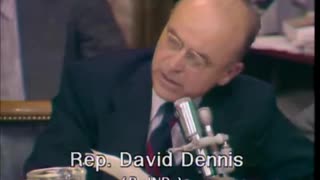 9:22:13
9:22:13
The Memory Hole
3 months agoNixon Impeachment Hearings Day 4 (1974-07-26)
704 -
 LIVE
LIVE
After Work Gaming
7 hours ago $1.52 earned“🍺 SOJU SATURDAY “🍺 THE FINALS SEASON 6
180 watching -
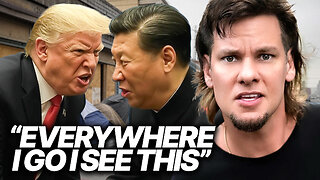 19:01
19:01
Russell Brand
13 hours agoTheo Von Just SHOCKED EVERYBODY With His Take on Trump Tariffs
100K111 -
 14:22
14:22
Tundra Tactical
8 hours ago $5.47 earnedTRUMP DOJ Decides CZ Scorpion Is A Decepticon.
47.2K15 -
 4:53:37
4:53:37
Culturama Podcast
6 hours ago $4.52 earnedEaster Special! Hollow Knight Stream!
39K4 -
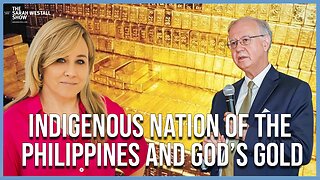 1:04:29
1:04:29
Sarah Westall
9 hours agoThe Philippines and Massive Stores of Gold for all the People of the World w/ Joseph Allain
60.9K44 -
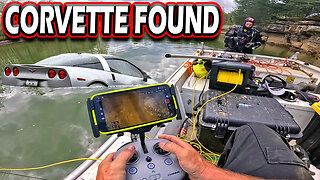 17:23
17:23
Exploring With Nug
18 hours ago $7.50 earnedCorvette Found Underwater! Continuing The Search For Laresha Walker!
52.4K2 -
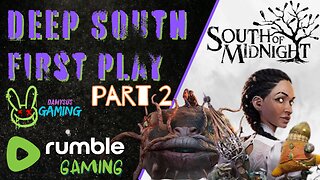 3:06:31
3:06:31
Damysus Gaming
6 hours agoWeaving into the Deep South: South of Midnight First Play! Part 2
12.1K2 -
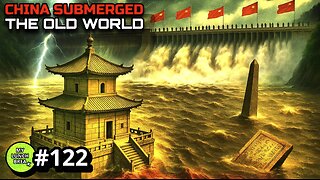 24:55
24:55
MYLUNCHBREAK CHANNEL PAGE
14 hours agoDams Destroyed China
72.2K44 -
 5:44:44
5:44:44
BigTallRedneck
7 hours agoFORTNITE - THE QUEST FOR THE OPAL PICKLE
11.8K3